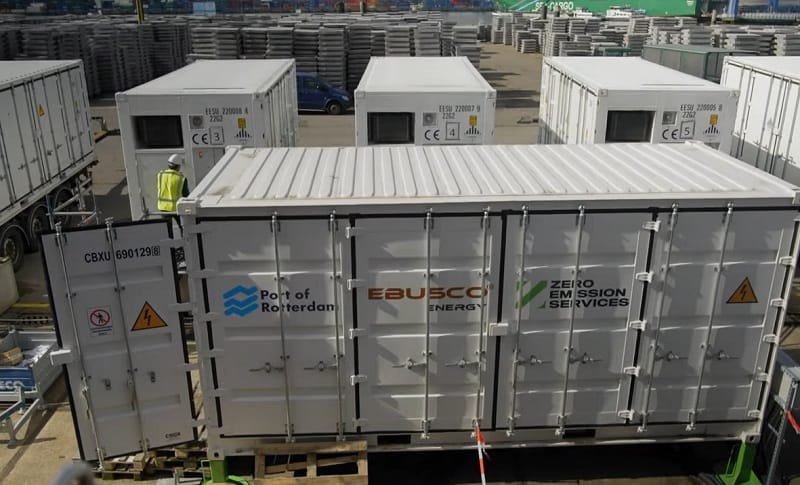Port of Rotterdam – A recent pilot project at the Steinweg Beatrix Terminal in Rotterdam has demonstrated the successful use of moveable shore power through battery containers for seagoing vessels, representing a significant milestone in reducing emissions during vessel docking. The pilot involved vessels from the Cargow shipping company, marking the second phase of an ongoing effort to explore alternative power solutions for maritime operations.
This pilot follows an initial test conducted at Parkkade in 2019/2020, where smaller vessels were connected to shore power. However, the recent trial represents a step forward, as the vessels from Cargow have higher energy demands, and the pilot took place at an operational terminal rather than a public dock. The use of mobile battery containers from Zero Emission Services (ZES), known for their work on battery-powered inland vessels, highlights the potential for this technology in a broader maritime context.
Table of Contents
Key Innovations and Technological Advances
The Port of Rotterdam Authority, in collaboration with the Municipality of Rotterdam, coordinated the project. They now aim to explore the possibility of a wider application of mobile shore power concepts across different maritime settings. These moveable battery containers could provide a flexible solution for locations lacking grid electricity or where permanent shore power connections are not feasible due to grid congestion.
The pilot integrated multiple technological components on both the vessel and shore sides, optimizing logistics for the mobile power concept. The application of shore power from mobile batteries has proven to be technically feasible. However, due to the higher costs compared to standard shore power, its use may be limited to specific locations where grid-based electricity is unavailable or challenging to implement.
Broader Implications for Zero Emission Services
For Zero Emission Services (ZES), this pilot offers a potential new revenue model by expanding their battery technology beyond inland vessels to seagoing ships. This move aligns with Rotterdam’s ongoing commitment to reducing carbon emissions and improving air quality in urban areas. The pilot was partially funded through government subsidies from the Nationaal Samenwerkingsprogramma Luchtkwaliteit (National Air Quality Cooperation Programme), which aims to enhance air quality, particularly in densely populated regions.
Looking Ahead
The success of this pilot indicates the promising future of moveable shore power for vessels, particularly in ports where grid connections are limited. The Port of Rotterdam Authority is now focused on assessing how this technology can be scaled for wider adoption, especially in locations where flexible shore power solutions are necessary.
The pilot is part of the broader initiative by the Port of Rotterdam Authority to strengthen the port’s competitive position, not only as a leading logistics hub but also as a world-class industrial complex committed to sustainable growth and environmental responsibility.
About Zero Emission Services (ZES)
Zero Emission Services (ZES) is at the forefront of developing and deploying battery-powered solutions for maritime transport, primarily focusing on inland shipping. Their innovative battery containers, designed to supply zero-emission power, are now being explored for use in seagoing vessels, offering a greener alternative fuel to traditional fuel sources in ports and beyond.
About the Port of Rotterdam Authority
The Port of Rotterdam Authority is dedicated to enhancing the port’s standing as a global logistics hub and industrial complex. Their core objectives include developing, managing, and operating the port sustainably while providing fast and safe services for shipping. The Authority aims to foster innovation in port operations, with a strong focus on environmental sustainability.
Source The Port of Rotterdam

